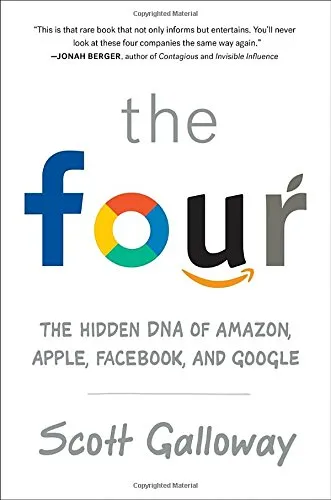Understanding the amazing successes – and uncomfortable truths – of Amazon, Apple, Facebook, and Google
What are the success factors of the tech giants Amazon, Apple, Facebook and Google? What are the intended (as well as unintended) consequences of so much power concentrated in their hands? This insightful and entertaining book tells you a lot you may not know.

“Over the last 20 years, four technology giants have inspired more joy, connections, prosperity, and discovery than any entity in history,” begins Scott Galloway in his highly entertaining and informative book, The Four: The Hidden DNA of Amazon, Apple, Facebook, and Google.
Scott is a professor at New York University’s Stern School of Business, where he teaches brand strategy and digital marketing. A serial entrepreneur, he has founded nine firms, including L2, Red Envelope, and Prophet. Scott has a weekly YouTube series, ‘Winners and Losers.’
For a business book by a professor, the material is unusually provocative and funny, with lots of swear words liberally sprinkled in. The 11 chapters are spread across 310 pages, and share innovation insights as well as profound questions about the concentration of power in a handful of digital companies.
The book offers many lessons to startups and innovators – not just about the do’s, but also the don’t’s of tech disruption. There is a lot of hero worship and idolatry surrounding the GAFA companies (Google, Apple, Facebook, Amazon), but society also needs to look at the uncomfortable truths and larger ethical issues about their dominance.
The GAFA companies are among the largest in the world in terms of market capitalisation, thanks to the combination of receptor reach and intelligence to extract value. With insightful charts and graphs, Scott shows how these four firms have eclipsed earlier giant corporations that have had much larger workforces.
However, the four GAFA giants have also been accused of manipulating governments and consumers, distortion of the job market, and exploiting the basest of human instincts for profitability and growth.
Amazon
Amazon takes the friction, drudgery, effort and time out of shopping. It has built world-class infrastructure with compelling customer service, powered by wave after wave of innovations such as artificial intelligence, IoT, drones and voice-activated home devices. It has also spawned other profitable lines like its cloud business, and is expanding into logistics and ocean freight.
At a base level, Amazon succeeds because it appeals to our hunter-gatherer instincts to keep accumulating stuff with minimal effort, hunt for bargains, and feel good about getting deals. Amazon is extending its bets into the next wave of multi-channel retail as well, thanks to moves like its acquisition of Whole Foods.
Amazon’s core competence is storytelling, says Scott. He explains that Amazon has a low cost of raising capital because Jeff Bezos has spun investors “the most compelling, yet simple story ever told in business: Earth’s Biggest Store.” (See also my book review of Let the Story do the Work by Esther Choy.)
Amazon has been able to write off costly failures like its mobile phone initiative as a learning experiment, which few other listed companies would have been able to do. It has set expectations of investors for lower profits but higher growth, along with a few “crazy initiatives.”

Amazon has been able to build huge moats against competitors. But some consequences of the rise of online shopping in the US are the demise of many malls, chains and brands, and the loss of countless jobs such as cashiers, floor stockists, sales associates, and security guards. (See also my book review of 'Six Billion Shoppers' by Porter Erisman.)
Apple
Apple is the cult-like coveted badge of wealth and attraction to the opposite sex, says Scott. It has mastered global supply chains to build a product at a relatively low cost – and sells it at a premium, to become the most profitable company in history.
“The sector that has inspired Apple’s modern-day strategy is the luxury industry,” explains Scott. It started off with a computer seen as being more intuitive, but began the transformation towards craftsmanship, elegance and luxury with the iPod and then iPhone.
Like other fashion stores, Apple’s retail stores are “temples to the brand;” they have set it apart from other commodity laptops and smartphones. “Steve Jobs' decision to transition from a tech to a luxury brand is one of the most consequential – and value-creating – insights in business history,” says Scott.

At the same time, Apple has waded into controversies over tax evasion, and its refusal to a government request to unlock the iPhone of a San Bernardino assailant, who killed 14 people in 2015. “Apple is the largest tax evader in the history of US business,” says Scott. (Apple has also not chosen to address “tech for good” imperatives the way former competitors like Nokia did in emerging economies.)
“As measured by adoption and usage, Facebook is the most successful thing in the history of mankind,” says Scott. Along with its properties such as Instagram and WhatsApp, it dominates consumer time and engagement spent online, and resonates with the younger generation’s belief that “to be is to share.”
Facebook is gaining influence faster than any other company and competes with Google for ad revenue. “Facebook, in combination with Google, will lay waste to much of the analogue and digital media worlds,” predicts Scott.
At the same time, Facebook has run into controversy over the challenges of fake news and the use of algorithms which end up amplifying the polarisation of society. For Facebook to call itself a platform and not media is an abdication from responsibility, says Scott.

“Google is a modern man’s God. It’s a source of knowledge – ever present, aware of our deepest secrets,” says Scott. Unlike traditional advisors to royalty, Google offers knowledge to everyone, despite background or educational level.
“The trust we place in Google is un-rivalled,” says Scott, thanks to its separation of organic and paid results. This bond of trust makes Google the most influential of the GAFA companies, Scott opines.
Its knowledge of consumer intentions and decision makes this search and ad giant the “executioner of traditional brands and media.” Facebook and Google focus largely on commercial gains of media and are challenging the world of journalism.
“Journalism is hard, sometimes dangerous work,” says Scott in defense of the news media. Google has also run into controversy over revenue share with publishers, and anticompetitive practices.
Competitors and contenders
Google is like the brain, Amazon is like acquisitive fingers, Facebook is about emotion, and Apple is about luxury and sex appeal, jokes Scott. So who can take on the Big Four GAFA companies – or will there be place for a fifth giant?

Scott lists eight features which any company must have to be able to attain such dominant status: vertical integration, AI, product differentiation, visionary capital, global reach, likability, talent, and global presence.
Challengers, for example, must be able to match Google’s image of a public good, or Apple as a hip company. “Perception is a company’s reality,” says Scott.
He assesses the worth of some potential global challengers and analyses some reasons for their disqualification: Alibaba (murky governance structure), Tesla (a great green and luxury brand but not big enough yet), Uber (ethical and leadership challenges), Walmart (still in the race), Microsoft/LinkedIn (strong in the enterprise and professional community), and AirBnB (lack of vertical integration).
Living in a GAFA world
So what does it take to succeed in a lopsided world where digital giants are exercising power out of proportion to the size of their workforces? There is a huge gap between good and great, and between good and the rest, cautions Scott.
In addition to domain knowledge, Scott ranks the following key capabilities: emotional intelligence, curiosity, ownership, good college education, certified upskilling, location in a creative urban hub, and professional networking.
“Don’t follow your passion, follow your talent,” advises Scott. Self-reflect on your abilities to manage the differing stages of a company’s growth – startup, growth, maturity and stagnation/stability.
“Highly rational and intelligent people are usually not good entrepreneurs,” says Scott; they are generally risk averse, or may not be good at selling. People who like repeatable processes and can deal with organisational politics are better suited for large firms, where they can scale their skills. (See also my reviews of the books Startup Leadership and Entrepreneurial Strengths Finder.)
In sum, this book is an easy and humorous read, while also raising serious questions about the nature of work in the digital age, clash and convergence of analogue and digital worlds, the meaning of business success, and future directions of the economy.








